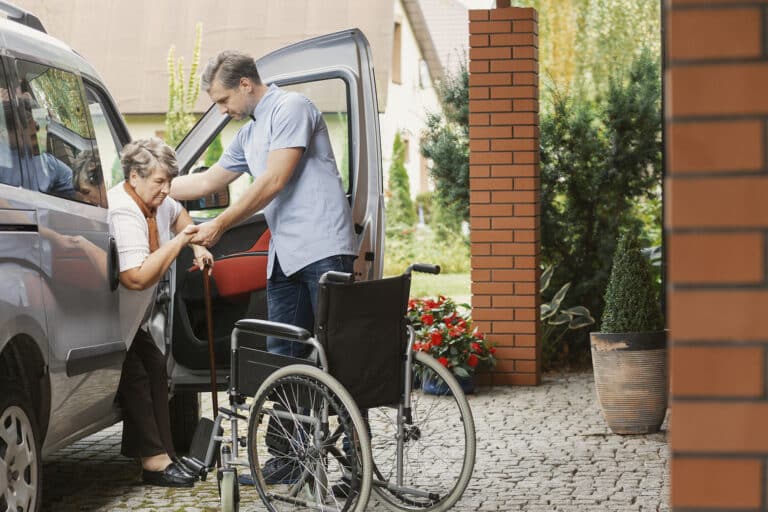For many older adults, driving represents independence. However, as aging affects vision, reaction time, and cognitive abilities, continuing to drive can become a serious safety concern. Deciding when it’s time for a senior to stop driving is never easy, but recognizing the warning signs and exploring alternative transportation options—such as companion care at home—can provide a safer, more comfortable solution.
Understanding the Risks of Senior Driving
Age-related changes can make driving more dangerous for older adults. According to the National Highway Traffic Safety Administration (NHTSA), drivers aged 65 and older are more likely to be involved in fatal car crashes than younger drivers. Factors such as slower reflexes, vision impairment, and medication side effects contribute to increased risks on the road.
In 2020, the Centers for Disease Control and Prevention (CDC) reported that nearly 7,500 adults aged 65 and older were killed in motor vehicle crashes, and more than 200,000 were treated in emergency departments for crash-related injuries. These statistics highlight the importance of assessing whether a senior can continue driving safely.
Signs Your Senior Should No Longer Drive
While aging alone does not mean a person should stop driving, certain signs indicate it may be time for a loved one to retire from the road:
- Frequent close calls or minor accidents – Scrapes, dents, or near-misses can signal declining driving ability.
- Delayed reaction times – Hesitation at intersections, slow responses to traffic signals, or difficulty braking can indicate slower reflexes.
- Confusion or disorientation – Getting lost on familiar routes or struggling with navigation can be signs of cognitive decline.
- Difficulty judging distances – Trouble gauging the space between vehicles, misjudging turns, or drifting between lanes can increase accident risks.
- Increased anxiety while driving – A senior who expresses fear, nervousness, or discomfort while driving may no longer feel confident behind the wheel.
- Medical conditions affecting mobility or awareness – Arthritis, vision impairment, dementia, and other health conditions can impact driving ability.
If any of these concerns are present, it may be time to discuss alternative transportation options, like companion care at home services, to keep your loved one safe.
How Companion Care at Home Can Help
When a senior stops driving, it can feel like a major loss of independence. However, companion care at home providers can provide support that allows older adults to remain active and engaged without the risks of being behind the wheel.
Safe and Reliable Transportation
One of the most significant benefits of companion care at home services is access to safe transportation. Caregivers can drive seniors to medical appointments, grocery stores, social events, and other essential errands. This ensures that they continue their routines without feeling isolated.
Social Engagement and Emotional Support
Giving up driving can lead to loneliness, as many seniors may struggle to visit friends, attend community activities, or participate in hobbies. A companion care at home caregiver provides social interaction, conversation, and companionship to help prevent isolation and keep seniors mentally engaged.
Assistance with Daily Activities
Beyond transportation, companion care at home caregivers help with daily tasks such as meal preparation, housekeeping, and medication reminders. Having extra support ensures that seniors continue to live comfortably and independently at home.
Promoting a Healthy and Active Lifestyle
Staying physically and mentally active is essential for aging well. Companion care at home caregivers encourage light exercise, accompany seniors on walks, and help them stay engaged in activities they enjoy. This added support helps maintain overall well-being even after driving is no longer an option.
Supporting Seniors Through This Transition
Deciding to stop driving can be emotional for seniors, but having a plan in place can make the transition easier. Companion care at home offers a practical solution, ensuring that seniors remain independent while staying safe. At Queen City Elder Care, we provide compassionate support to help seniors maintain their quality of life.
If your loved one is showing signs that it may be time to stop driving, consider how professional companion care at home services can help them adjust. Queen City Elder Care is here to provide the care and companionship needed to continue aging in place with confidence.
If you or an aging loved one are considering Companion Care at Home in Cincinnati, OH, please contact the caring staff at Queen City Elder Care today at (513) 510-4410
Queen City Elder Care provides Home Care in Cincinnati, Hyde Park, Indian Hill, Madeira, Montgomery, Amberley, Anderson, Loveland, Mason, Wyoming, and surrounding areas.
Michele Vollmer is a visionary leader who is perpetually searching for ways to improve, so to remain at the leading edge of the home care industry.She has served in the healthcare industry since 1989, including pharmaceutical and home health sales, as well as hospice sales and sales management
- How Does In-Home Respite Care Support Family Caregivers? - May 22, 2025
- Honoring Seniors During Older Americans Month - May 6, 2025
- 5 Great Benefits of Senior Home Care - April 28, 2025




